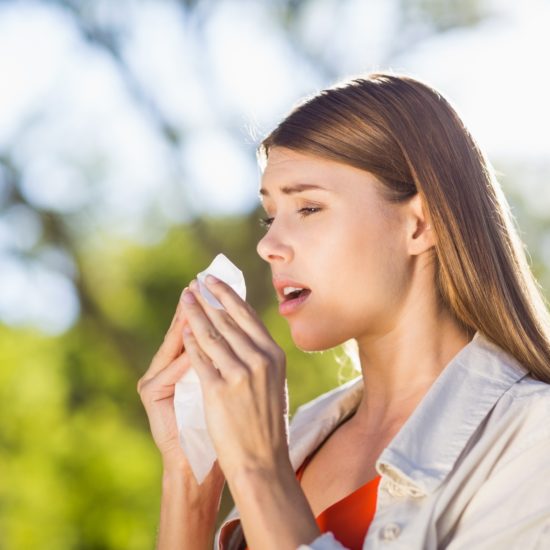What is the Difference Between Cold and Allergies?

Its summer but you’re feeling lousy. You might have a runny nose, congestion, and watery eyes, but you’re unable to tell if it’s a summer cold or seasonal allergy. Telling the difference between a cold and allergies is difficult to do – especially if you need to choose between Benadryl and Claritin. Read on to learn about the difference between cold symptoms and allergy symptoms.
Colds are caused by viruses that trigger symptoms because of your body’s immune response. The common cold is contagious and causes symptoms like coughing, sneezing, and congestion. Allergies, on the other hand, are not caused by a virus but by an overactive immune system. When harmless substances (like pollen) enter your body, your body over-reacts and releases the chemical histamine into your blood stream. This causes swelling in your nasal passages, coughing, sneezing, and itchy or watery eyes. Allergies are not contagious but can be commonly mistaken for a cold.
How to determine if you have a cold or allergies:
Colds
Symptoms of a cold are slightly different than symptoms of allergies. Colds tend to last anywhere between 3 days and 2 weeks. They are most common in the winter, but you can catch a summer cold. The symptoms tend to take a few days to appear after the infection with the virus occurs.
Common symptoms:
- Aches
- fever
- cough
- fatigue
- sore throat
- runny or stuffy nose (yellow mucus)
It is not likely that you will have itchy or watery eyes if you have a cold.
Allergies
Symptoms of allergies can last days to months – if you are exposed to the allergen that triggers your symptoms. Allergies usually occur in the spring and summer months when pollen and allergens are more likely to be airborne, but allergies can occur at any time of year. Usually, your symptoms will occur immediately after you have been exposed to an allergen.
Common symptoms:
- Itchy or watery eyes
- sore throat
- runny or stuffy nose (usually clear mucus)
- sometimes fatigue
If you have allergies, you will never have a fever or aches.
The symptoms of colds and allergies are very similar; however, the main difference is that colds does not last more than 14 days.
Also Read
Does Cold FX Really Strengthen Your Immune System?
Healthy heart tips – Pharmapassport
Natural Remedies for Hay Fever


